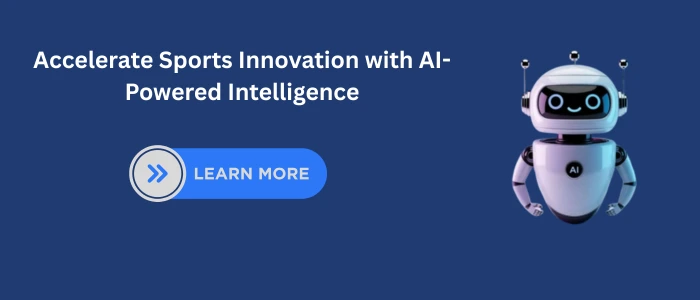AI is reshaping sports tech by turning data from wearables, match tracking, and video into real-time decisions. Teams use AI to optimize training loads, reduce injury risk, and personalize athlete development based on patterns that humans can’t spot at speed. Beyond performance, AI also strengthens scouting, game strategy, and operational planning helping organizations compete smarter on and off the field.
Foundations of AI in Sports Technology
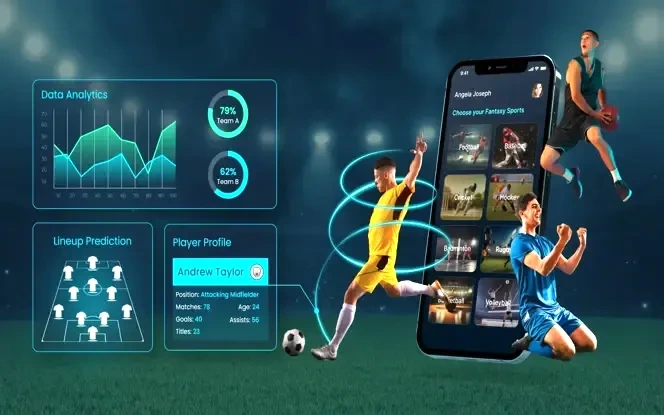
AI for Sports Tech refers to the use of artificial intelligence, machine learning, and advanced data analytics within sports performance ecosystems. These technologies process historical and real-time data to identify trends, correlations, and predictive indicators.
Unlike traditional approaches that rely heavily on observation and isolated metrics, AI-based systems provide integrated insights across performance, training, and recovery dimensions. This enables sports organizations to adopt a more structured and proactive approach to performance management.
Role of AI in Athlete Performance Management
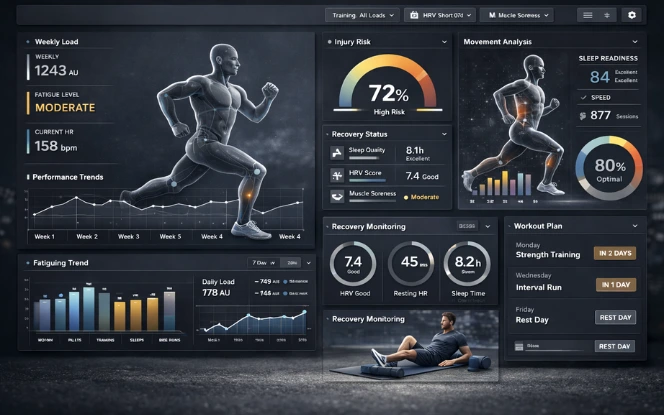
Performance Optimization
These insights are powered by machine learning for sports predictions, enabling teams to forecast performance trends and optimize training strategies proactively.This allows sports professionals to monitor consistency, efficiency, and progression trends across training cycles.By identifying patterns and deviations, AI supports informed planning and helps maintain performance stability over time.
Workload Monitoring and Injury Prevention
Through advanced workload monitoring supported by sports analytics algorithms, AI evaluates indicators, movement data, and recovery markers to assess stress levels and prevent overuse injuries. Through continuous analysis, AI highlights potential risk patterns associated with fatigue and overuse. This enables proactive workload management and supports safer training structures.
Recovery and Readiness Analysis
AI assists in monitoring recovery progress by evaluating physiological and performance-related signals. These insights help assess readiness levels and guide training intensity adjustments.
The result is a more balanced approach to training continuity and recovery management.
Real-World Use Cases of AI in Sports
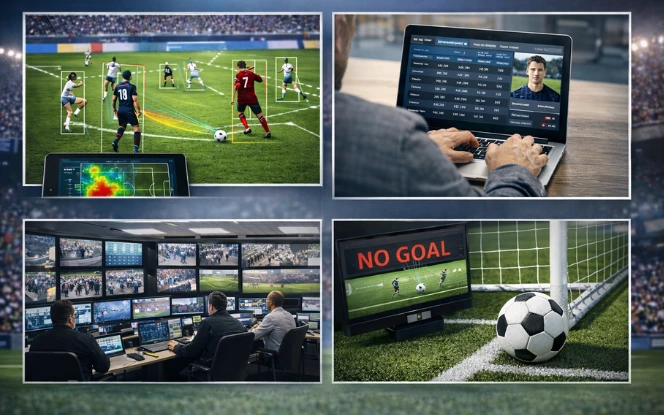
AI is helping sports teams make smarter decisions both on and off the field, enhancing performance, operations, and fan engagement. Key applications include:
Player Tracking – Use advanced video analysis and sensor data to monitor player movements, positioning, and tactical performance in real time.
Scouting Analytics – Leverage data-driven insights to identify emerging talent, evaluate potential recruits, and optimize recruitment strategies.
Automated Highlights – Generate customized highlights and content for fans, delivering personalized experiences and increasing engagement.
Smart Stadium Operations – Improve match-day efficiency by predicting crowd flow, managing queues, and enhancing overall stadium safety.
Officiating Support – Utilize AI-assisted ball tracking and goal-line technology to support referees and ensure accurate, fair decision-making.
How an AI Sports Platform Is Built
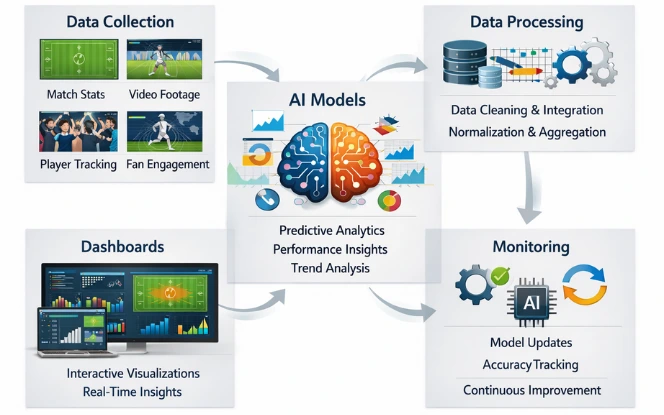
A robust AI sports platform combines structured data, advanced analytics, and user-friendly tools to deliver actionable insights through AI-powered platforms:
Data Collection – Aggregate diverse inputs such as match statistics, video footage, player tracking data, and fan engagement metrics to form a comprehensive dataset.
Data Processing – Clean, normalize, and integrate the collected data to ensure consistency and reliability before feeding it into AI models.
AI Models – Apply predictive and analytical algorithms to extract insights, identify trends, and support decision-making for performance and operational improvements.
Dashboards – Visualize complex data in intuitive dashboards, making it easy for coaches, analysts, and management to interpret insights and act quickly.
Monitoring – Continuously evaluate model performance, update algorithms with new data, and ensure ongoing accuracy and relevance of insights.
AI-Powered Sports Analytics
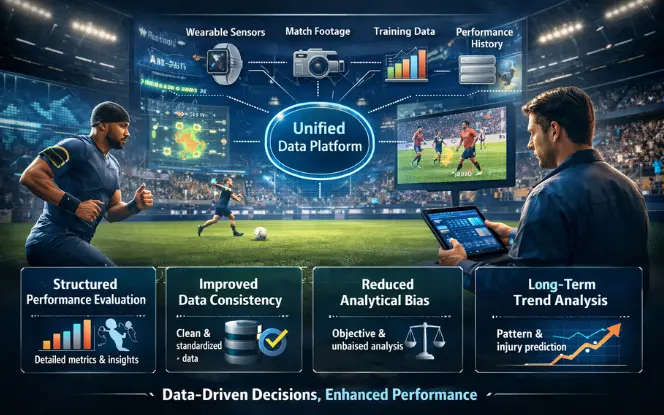
AI-powered sports analytics helps teams analyze historical and real-time data to identify trends, monitor performance, and support strategic planning. By unifying data from multiple sources through big data analytics in sports, including wearable sensors, match footage, training logs, and historical databases, coaches and athletes get accurate, actionable insights.
Key Benefits
- Structured Performance Evaluation: Assesses players across physical and tactical metrics.
Improved Data Consistency: Standardizes diverse data sources for reliable analysis.
Reduced Analytical Bias: Provides objective, evidence-based insights.
Enhanced Long-Term Trend Visibility: Detects patterns to optimize strategy, prevent injuries, and support development.
How It Works
AI collects athlete data, analyzes it, and converts it into actionable insights:
- Data Sources: Wearables, GPS tracking, video footage, and historical performance records.
- Data Processing: Identifies trends, performance patterns, and early signs of fatigue or injury.
- Safe Implementation: Secure data handling, governance, and human oversight ensure responsible use.
Why It Matters
Short, accurate insights help teams make smarter decisions, improve performance, and maintain a competitive edge without overwhelming readers.
Data Integration and System Connectivity
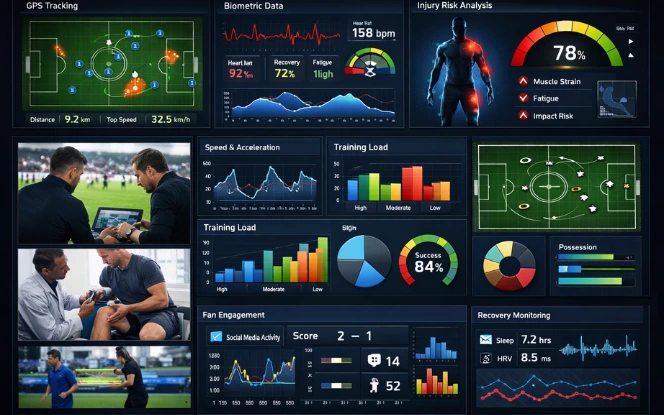
By leveraging AI for Sports Tech, organizations can unify multiple performance data streams, ensuring coaches, analysts, and medical staff have real-time insights for smarter decision-making. This integration ensures that data is accurate, accessible, and actionable, allowing coaches, analysts, and medical staff to make informed decisions quickly.
A connected system enables consistent performance insights across departments, supporting collaborative decision-making in areas such as training, injury prevention, tactical planning, and fan engagement. By breaking down data silos, organizations can leverage AI to optimize athlete performance, streamline operations, and maintain a holistic view of the sports ecosystem, creating smarter, more coordinated workflows.
AI and Fan Engagement Technology

By adopting fan engagement technology, AI helps sports organizations connect more effectively with audiences through AI-powered fan engagement systems, personalize experiences, and strengthen loyalty. By analyzing vast amounts of digital interaction data, social media trends, and content behavior patterns, AI provides actionable insights that help teams understand what drives fan engagement. This intelligence allows organizations to deliver personalized experiences, create relevant content, and build deeper relationships with their audience.
Key benefits of AI-driven fan engagement include:
- Improved Content Personalization: AI analyzes fan preferences, behavior, and consumption patterns to deliver tailored content that resonates with each audience segment.
- Strengthened Audience Engagement: Through predictive analytics, AI helps identify the most engaging content types, optimal posting times, and interactive formats, increasing fan interaction and loyalty.
- Enhanced Digital Experience Consistency: AI ensures a seamless, data-driven digital experience across websites, apps, and social media platforms, providing fans with relevant updates and immersive experiences.
By leveraging AI for fan engagement, sports organizations can move from generic outreach to precise, data-driven strategies, fostering loyalty, increasing participation, and creating memorable digital experiences aligned with fan expectations.
Traditional Sports Analysis vs AI for Sports Tech
| Aspect | Traditional Analysis | AI for Sports Tech |
|---|---|---|
| Data Handling | Manual and segmented | Automated and integrated |
| Insight Generation | Descriptive | Predictive and analytical |
| Decision Support | Experience-based | Data-supported |
| Scalability | Limited | Highly scalable |
| Long-Term Analysis | Minimal | Trend-focused |
Application Across Sports Ecosystems
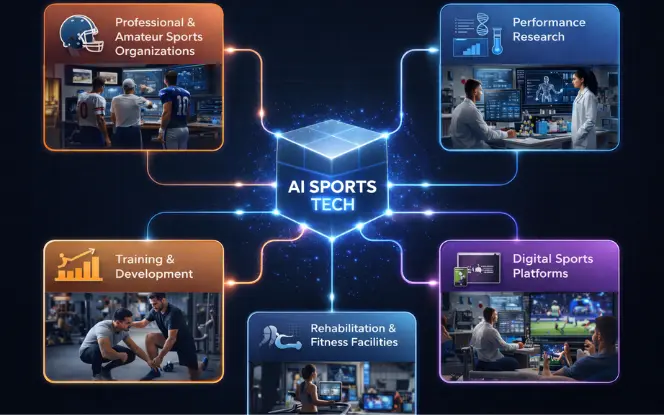
AI for Sports Tech can be applied across a wide range of sports-related environments, helping organizations leverage data intelligence effectively:
- Optimize team performance, strategy, and player management using Generative AI for sports.
- Training and Development Institutions: Track athlete progress, customize training plans, and identify skill gaps.
- Performance Research Environments: Analyze data for performance studies, predictive modeling, and trend identification.
- Rehabilitation and Fitness Facilities: Monitor recovery, prevent injuries, and enhance fitness programs.
- Digital Sports Platforms: Improve fan engagement and deliver data-driven insights through AI-powered sports app development.
Its flexibility ensures that both large and small organizations can benefit from AI-driven analysis and decision-making across the entire sports ecosystem.
Cost Considerations
| Factor | Low-Cost Option | High-Cost Option | Approx. Cost (USD) |
|---|---|---|---|
| Users / Athletes | 30 athletes | 100+ athletes | $5,000 – $18,000 |
| Data Integration | Wearables only | Wearables + Video | $10,000 – $35,000 |
| Analytics Level | Basic tracking | Injury prediction | $7,000 – $22,000 |
| Predictive AI | Simple models | Advanced forecasting | $15,000 – $50,000 |
| Support & Maintenance | Basic cloud support | Full managed platform | $2,000 – $9,000/year |
Future Outlook of AI in Sports Technology
AI is set to transform the sports industry in multiple ways:
- Enhanced Performance & Injury Prevention: Advanced AI tools and digital athlete twins will monitor player health, predict potential injuries, and simulate performance outcomes, enabling personalized training and recovery plans.
- AI-Driven Coaching & Strategy: Machine learning-powered systems will help coaches create adaptive playbooks, analyze opponents in real time, and make data-supported tactical decisions during matches.
- Smart Stadiums & Fan Engagement: AI will enhance the fan experience through personalized content, predictive crowd management, and seamless digital services, creating more immersive interactions.
- Operational Efficiency & Strategic Advantage: Organizations leveraging AI-powered sports platforms will gain actionable insights from vast datasets., improving decision-making, long-term planning, and overall efficiency, securing a competitive edge in a data-driven sports landscape.
Conclusion
AI for Sports Tech provides a structured approach to managing sports performance data, turning complex information into actionable insights for safer training and consistent results. Designed to complement human expertise, it helps sports organizations build sustainable, data-driven performance systems. With support from SDLC Corp, teams benefit from end-to-end guidance and scalable solutions. Through specialized AI development services, SDLC Corp ensures secure, high-performance AI solutions that enhance competitive advantage locally and globally.
FAQs
What does AI for Sports Tech focus on?
AI for Sports Tech focuses on organizing and analyzing performance, training, and recovery data to generate structured insights. These insights help sports organizations improve consistency, efficiency, and clarity in performance-related decision-making.
Is AI intended to replace sports professionals?
No. AI is designed to support coaches, analysts, and medical teams by enhancing data visibility and analytical depth. Human expertise remains central to interpretation, planning, and final decision-making.
Can AI be used across different sports disciplines?
Yes. AI systems are highly adaptable and can be configured to align with varying performance metrics, training structures, and analytical requirements across different sports disciplines.
How does AI support injury risk management?
AI evaluates workload patterns, fatigue indicators, and recovery signals to identify trends associated with increased physical stress. This enables proactive workload management and supports safer training strategies.
Is AI suitable for long-term performance planning?
Yes. By analyzing historical and ongoing data, AI helps identify long-term trends and performance patterns. This supports sustainable planning, progression monitoring, and strategic performance development.
How is data security handled in AI systems?
AI platforms follow structured data governance frameworks that prioritize privacy, security, and regulatory compliance. Access controls and ethical data usage ensure that performance data is protected and handled responsibly.
How does SDLC Corp support clients in implementing AI solutions for sports technology?
SDLC Corp supports clients end-to-end by integrating AI capabilities throughout the SDLC. From ideation and feasibility analysis to model development, testing, and deployment, our teams ensure AI solutions align with performance goals such as athlete analytics, game strategy optimization, and fan engagement. We also provide ongoing monitoring, optimization, and technical support to ensure long-term success.
How does SDLC Corp help ensure reliable and scalable AI-driven sports tech products?
SDLC Corp follows a structured SDLC approach that emphasizes scalability, accuracy, and real-time performance. We leverage robust data pipelines, rigorous AI model testing, and cloud-native architectures to handle high-volume sports data. Post-launch, our continuous support and maintenance services help clients adapt to evolving data, rules, and competitive demands in the sports industry.

